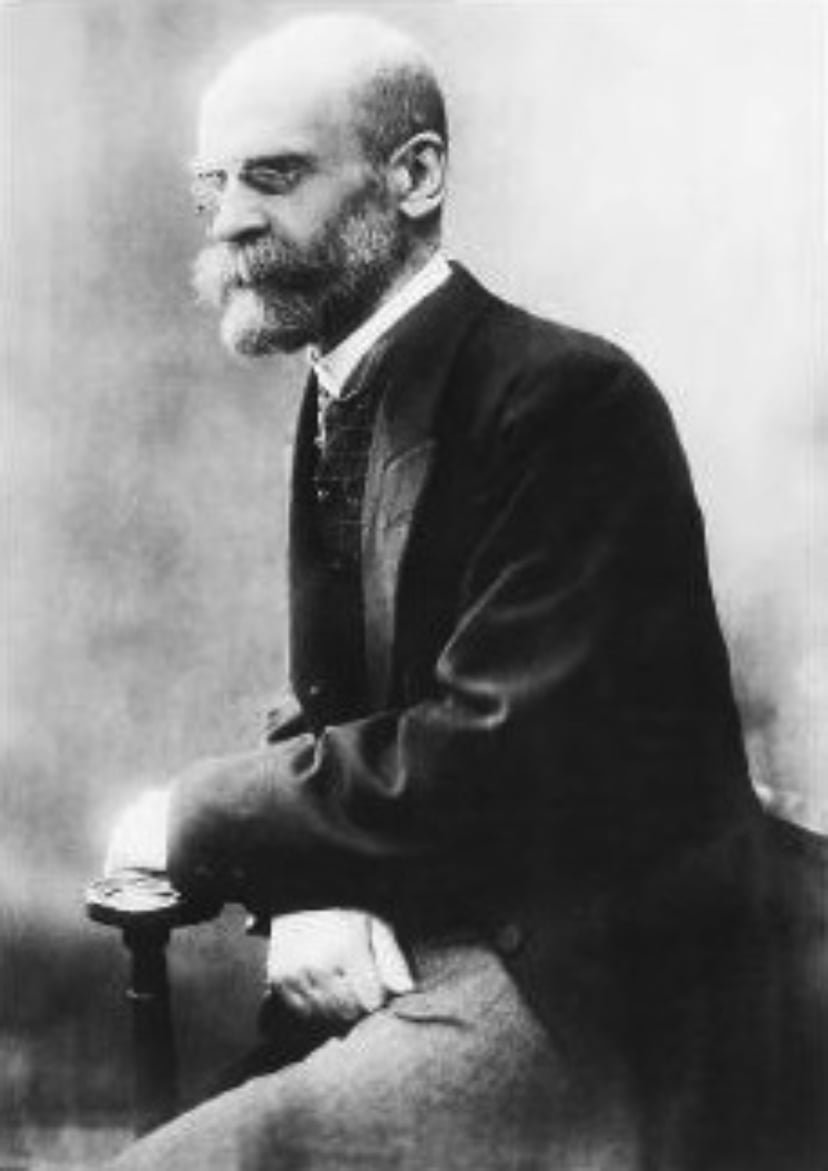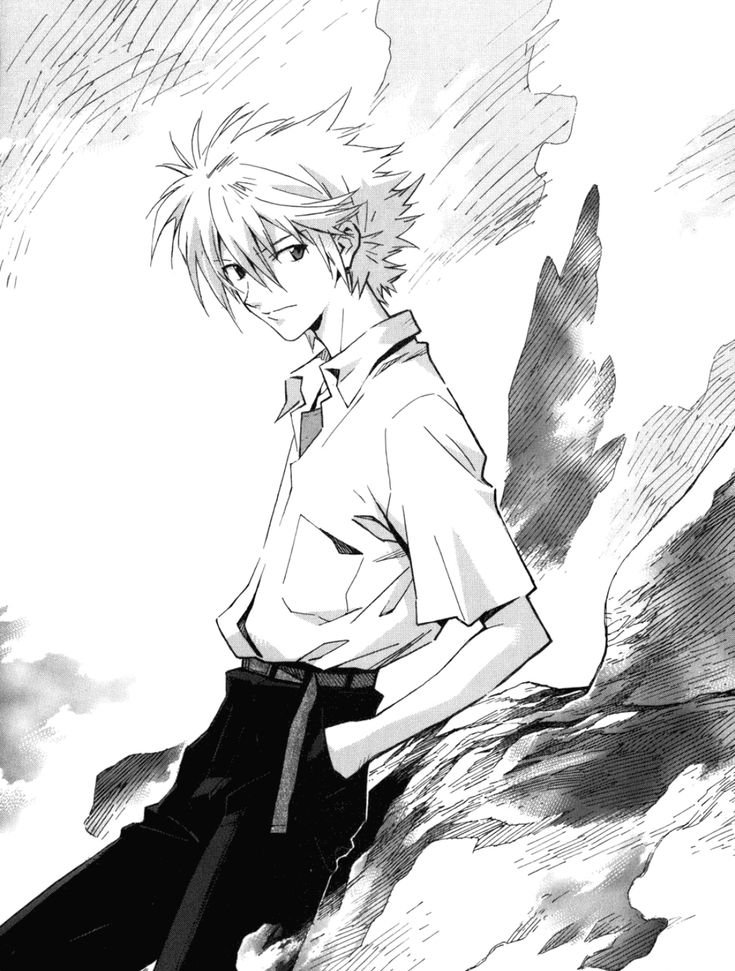

Kaworu Nagisa

|
渚カヲル
|
|
|---|---|
| Personal Description | |
| Nihongo | 渚カヲル |
| Informations | |
| Affiliation | Angel |
| Rank/Title | Fifth Child 17th Angel (NGE) |
| Age | 15 (born 13 September 2000 (Virgo) |
| Known Relatives | Unknown |
| First Appearance | “The Final Messenger”[NGE] Volume 7 |
| Seiyū | Akira Ishida |
| Voice Actor | Kyle Sturdivant |
Kaworu Nagisa
Japanese Name:渚 カヲル (Nagisa Kaworu)
Titles:Fifth Child, Seventeenth Angel (Tabris)
Franchise:Neon Genesis Evangelion
|
Émile Durkheim
|
|
|---|---|
| Born |
David Émile Durkheim
15 April 1858 Épinal, France
|
| Died | 15 November 1917(aged 59)
Paris,France
|
| Nationality | French |
| Alma mater | École Normale Supérieure |
| Known for | Sacred–profane dichotomy Collective consciousness Social fact Social integration Anomie Collective effervescence |
| Scientific career | |
| Fields | Philosophy, sociology, education, anthropology, religious studies |
| Institutions | University of Paris, University of Bordeaux |
| Influences | Immanuel Kant, René Descartes,Plato, Herbert Spencer,Aristotle, Montesquieu, Jean-Jacques Rousseau, Auguste Comte. William James, John Dewey, Fustel de Coulanges, Jean-Marie Guyau, Charles Bernard Renouvier, John Stuart Mill |
| Influenced | Marcel Mauss,Claude Lévi-Strauss, Talcott Parsons, Maurice Halbwachs, Jonathan Haidt, Lucien Lévy-Bruhl,Bronisław Malinowski, Fernand Braudel, Pierre Bourdieu, Charles Taylor, Henri Bergson, Emmanuel Levinas, Steven Lukes, Alfred Radcliffe-Brown, E. E. Evans-Pritchard, Mary Douglas, Paul Fauconnet, Robert N. Bellah, Ziya Gökalp, David Bloor, Randall Collins, Neil Smelser[1] |
Appearance
Kaworu Nagisa stands out with his ethereal, almost otherworldly appearance, echoing his Angelic origins. He has pale skin, silver-gray hair, and piercing red eyes, which give him an air of mystery and calm. His look is delicate and youthful, dressed most often in the standard white plug suit or NERV uniform, accentuating his serene demeanor and subtle detachment from the other characters.

Kaworu Nagisa’s serene expression and gentle demeanor hint at his mysterious origins and profound understanding, setting him apart as an enigmatic presence within Evangelion.
Personality
Kaworu’s demeanor is calm, introspective, and almost philosophical. He embodies empathy, sacrifice, and acceptance, approaching his existence and relationships with a depth that resonates with viewers. His dual identity as both Angel and human presents Kaworu as a bridge between two worlds, confronting questions about identity, purpose, and connection. His willingness to sacrifice himself speaks to his understanding of human fragility and the power of choice, and his kindness toward Shinji reaffirms Shinji’s worth in a way few others do.
Background and Story
Introduced as the enigmatic Fifth Child, Kaworu is assigned to pilot Evangelion Unit-02, taking over from Asuka Langley Soryu after her synchronization levels drop. But Kaworu’s arrival is no coincidence; he is, in reality, Tabris—the seventeenth Angel. Sent by SEELE with an agenda to breach NERV’s Terminal Dogma and find what he believes to be Adam, Kaworu’s journey leads him to discover Lilith instead, altering his entire mission. With this revelation, Kaworu is thrust into a moral dilemma, recognizing that his continued existence threatens humanity. This realization becomes pivotal, leading him to make a sacrificial choice for humanity’s sake.
Connection with Shinji Ikari
Kaworu’s bond with Shinji Ikari is one of the most defining elements of his character. From the moment they meet, Kaworu offers Shinji rare compassion and understanding, providing comfort during one of Shinji’s darkest periods of isolation. Their connection is profound, with Kaworu showing Shinji kindness, warmth, and acceptance—qualities Shinji rarely experiences from others. In the end, Kaworu entrusts Shinji with his fate, acknowledging that his survival would spell disaster for humanity. This act of trust and sacrifice leaves an indelible mark on Shinji, as Kaworu’s loss forces him to confront the pain of human connection and loss.
Key Relationships
Shinji Ikari
Kaworu’s relationship with Shinji is a transformative bond built on empathy and mutual understanding. He brings Shinji a rare sense of companionship, becoming both a confidant and source of strength during Shinji’s moments of despair.
SEELE and NERV
As both Angel and Evangelion pilot, Kaworu is at odds with SEELE’s agenda while also challenging NERV’s goals. His allegiance ultimately lies with neither faction, making him a unique force of autonomy, agency, and ultimately, self-sacrifice.
Legacy
Kaworu Nagisa’s journey is a profound reflection on themes of identity, sacrifice, and the desire for connection. His willingness to give up his life for humanity’s sake, and the kindness he shows Shinji, make Kaworu a unique figure in Evangelion, one whose influence lingers long after his departure. His character reminds viewers of the beauty and pain inherent in human relationships, solidifying him as one of the most iconic and impactful figures in the series.
Trivia
★ Kaworu’s connection to Beethoven’sSymphony No. 9, which he hums or listens to in the series, adds depth to his character, symbolizing unity and the beauty of human connection.
★ His Angelic origins grant him an aura that captivates viewers, distinguishing him from the other human characters and underscoring his unique role in Shinji’s life.
★ Despite his limited screen time, Kaworu has become one ofEvangelion‘s most memorable characters, embodying a brief yet striking moment of compassion in an otherwise intense series.